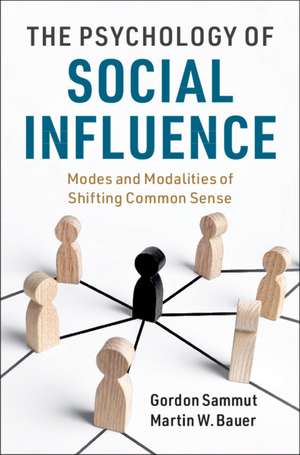The Psychology of Social Influence: Modes and Modalities of Shifting Common Sense
Autor Gordon Sammut, Martin W. Baueren Limba Engleză Paperback – 6 ian 2021
| Toate formatele și edițiile | Preț | Express |
|---|---|---|
| Paperback (1) | 287.28 lei 6-8 săpt. | |
| Cambridge University Press – 6 ian 2021 | 287.28 lei 6-8 săpt. | |
| Hardback (1) | 700.95 lei 6-8 săpt. | |
| Cambridge University Press – 6 ian 2021 | 700.95 lei 6-8 săpt. |
Preț: 287.28 lei
Nou
Puncte Express: 431
Preț estimativ în valută:
54.97€ • 57.54$ • 45.75£
54.97€ • 57.54$ • 45.75£
Carte tipărită la comandă
Livrare economică 01-15 aprilie
Preluare comenzi: 021 569.72.76
Specificații
ISBN-13: 9781108402897
ISBN-10: 1108402895
Pagini: 280
Dimensiuni: 153 x 230 x 20 mm
Greutate: 0.44 kg
Editura: Cambridge University Press
Colecția Cambridge University Press
Locul publicării:Cambridge, United Kingdom
ISBN-10: 1108402895
Pagini: 280
Dimensiuni: 153 x 230 x 20 mm
Greutate: 0.44 kg
Editura: Cambridge University Press
Colecția Cambridge University Press
Locul publicării:Cambridge, United Kingdom
Cuprins
1. Modalities of social influence: preconditions (public sphere) and demarcations (non-violence); Part I. Eternal Resources of Populism: 2. Crowding: contagion and imitation; 3. Leading: directors, dictators and dudes; Part II. Experimental paradigms: 4. Norming and frames of reference; 5. Conforming and converting; 6. Obeying: authority and compliance; 7. Persuading and convincing; Part III. Necessary Extensions: 8. Agenda setting, framing and mass mediation; 9. Designing and resisting artefacts; Part IV. Theoretical Integration: 10. Common sense: normalisation, assimilation and accommodation; 11. Epilogue: theoretical excursions and challenges; References; Index.
Recenzii
'The authors have produced an innovative, well-crafted book that skillfully guides students and experts to gain a deeper and more satisfactory understanding of the transformed nature of social influence in our fast-changing, 21st century world.' Fathali Moghaddam, Professor of Psychology, Georgetown University, and author of Mutual Radicalization
'The Psychology of Social Influence is wonderfully erudite and scholarly allowing the reader to appreciate the variety of perspectives and intellectual traditions that over time were brought to bear on social influence as a realm of phenomena … I can't think of a more comprehensive introduction to this fundamental topic of crucial importance to science and society.' Arie W. Kruglanski, Distinguished University Professor of Psychology, University of Maryland
'[Most college students] are not yet specialists or experts and so they need a survey and guide. This book seems the best fit for meeting that need. It can serve as a textbook for teaching senior undergraduate or beginning graduate classes across the field of social and behavioral sciences.' Hak-Soo Kim, Asian Journal for Public Opinion Research
'The Psychology of Social Influence is wonderfully erudite and scholarly allowing the reader to appreciate the variety of perspectives and intellectual traditions that over time were brought to bear on social influence as a realm of phenomena … I can't think of a more comprehensive introduction to this fundamental topic of crucial importance to science and society.' Arie W. Kruglanski, Distinguished University Professor of Psychology, University of Maryland
'[Most college students] are not yet specialists or experts and so they need a survey and guide. This book seems the best fit for meeting that need. It can serve as a textbook for teaching senior undergraduate or beginning graduate classes across the field of social and behavioral sciences.' Hak-Soo Kim, Asian Journal for Public Opinion Research
Notă biografică
Descriere
Theoretically different modalities of social influence are set out and a blueprint for the study of socio-political dynamics is delivered.
